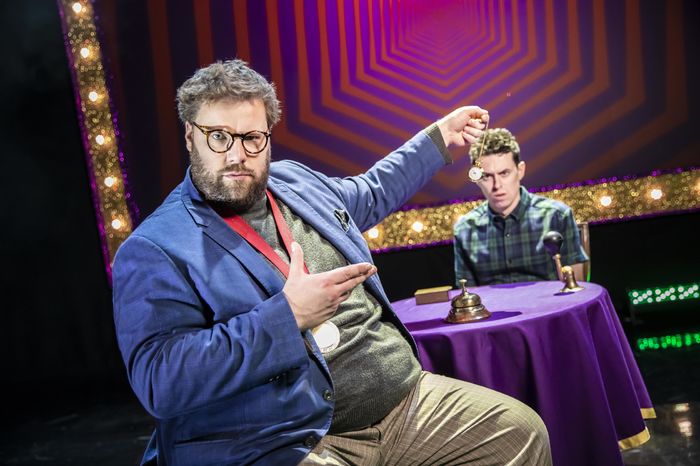The Blues occasionally drops the ball
Matilde Nannizzi reviews this high-energy production which shoots – but doesn’t always score

Salma Salifu’s The Blues was an enthralling, student-written ode to friendship, ambition, and most importantly 50-year-old men using their passion for football to drown out the noise of their divorce. Although the play got off to a rocky start in asserting itself as a comedy, it soon had the room in stitches.
The stripped-back stage of Corpus Playroom allowed space for Wes’ football tricks, workouts, and a great deal of chanting from his least favourite ‘hooligans’. No opportunity for laughter was wasted as perfectly chosen football classics made an entertaining soundtrack to the cast’s entrances and exits. The lighting, designed by Peter Baker, perhaps wasn’t as powerful or evocative as it might have wished to be, as the blue and red washes mimicking Tricky’s volatile mood were largely faded and inconsequential, nor were such colour changes consistent in the performance, but these are inevitable limitations of the Playroom.
"The Blues was an enthralling, student-written ode to friendship”
Salifu’s writing was brilliant in its ability to design the misogynistic, selfish, and egocentric character of Wesley Lennox and still generate raucous laughter. However, it was Salifu’s attempts to create more profound and touching moments where the script fell short.
Tricky (Rocco Mareri) is introduced as a broken and jaded young man after the career of his dreams was stolen from him by his estranged best friend. While he is convincing as a demoralised young man looking after his younger brother Zeke, attempts to portray an identity crisis seem misplaced, as The Blues largely prioritises humour and ridiculous portrayals of football hooliganism. Tricky is also repeatedly mentioned as someone who always gets into fights at matches, functioning as a kind of ‘ring-leader’ for football hooligans – but that fire didn’t entirely translate from the exposition into Mareri’s performance.
A similar situation occurred in the forbidden romance between Zeke (Ed Dache) and Wes’ younger sister Chy (Sasha Smith) which, while occasionally the source of some comedic relief, didn’t deliver in the intensity it needed at times. The resolution to the fight about their fundamentally incompatible backgrounds seemed abrupt and oversimplified, and their overall chemistry was let down by an apparent unfamiliarity with their lines and several issues with clarity.
“Attempts to portray an identity crisis seem misplaced, as The Blues largely prioritises humour”
There were however some standout performances. Aker Okoye shone as The Blues’ astoundingly self-involved football star, and his ad-libs enhanced the script, turning prop mishaps into comedic opportunity. Arrogant, immoral, and blissfully unaware of neglecting his sister, Wes still managed to remain oddly charming through Okoye’s quips and natural ability to appeal to the audience. He successfully maintained a high-energy performance throughout the show – and not just because of all the burpees in his rigorous training routine. The only unconvincing part of his character was the costume, designed by Alice Frecheville, since for most of the show this football ‘superstar’ was wearing tattered joggers with a noticeable hole in the knee.
Sebastian Burrows-Davila was exceptional as Shawn, and managed to strike the perfect balance in making his estuary accent hilarious without being overbearing or irritatingly artificial. Shawn and Rodney (Saha Salifu) made the ideal comic-relief duo, doubling as sports commentators and loyal middle-aged Chelsea fans. Their interactions were a high point in the show, and their ability to capitalise off any moment for a laugh, perhaps even unintentionally, was showcased by Salifu’s hysterical prop usage – who knew putting a jacket on wrong could be the star of an already humorous scene.
“Arrogant, immoral, and blissfully unaware of neglecting his sister, Wes still managed to remain oddly charming”
Martha Alexander as Sam charmingly balanced scheming against her antagonistic employer and acting as surrogate older sister to Chy. Her nuanced portrayal of Sam’s bitterness after having had to give up on her dream added a multi-dimensionality to her character that was slightly lacking in others. However, the repeated emphasis on her collection of career-destroying information was disappointingly anticlimactic as this ‘Chekhov’s journal’ was soon forgotten. This was possibly a missed opportunity for both comedy and drama – after all, Wes never even became aware of the mole living in his house.
The ensemble could generally have benefitted from clearer enunciation, though this can only be truly achieved once their lines are properly learnt. It seems that the reconciliation between estranged best-friends-turned-nemeses was slightly misplaced, as the emotional pinnacle of the plot and the audience were far more invested in the homoerotic overtones between them. Having said this, the show ended with a bang which had the audience in pieces and earned the cast a standing ovation on their opening night. The Blues has great potential as a comedy, but should be wary of juggling too many balls at once.
 Features / Should I stay or should I go? Cambridge students and alumni reflect on how their memories stay with them15 December 2025
Features / Should I stay or should I go? Cambridge students and alumni reflect on how their memories stay with them15 December 2025 News / Cambridge study finds students learn better with notes than AI13 December 2025
News / Cambridge study finds students learn better with notes than AI13 December 2025 News / Dons warn PM about Vet School closure16 December 2025
News / Dons warn PM about Vet School closure16 December 2025 News / News In Brief: Michaelmas marriages, monogamous mammals, and messaging manipulation15 December 2025
News / News In Brief: Michaelmas marriages, monogamous mammals, and messaging manipulation15 December 2025 Comment / The magic of an eight-week term15 December 2025
Comment / The magic of an eight-week term15 December 2025









